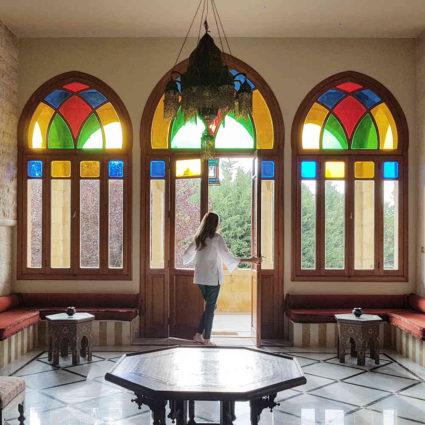The famous Mezher palace located in Hammana and overlooking the valley was once the residence of the famous French poet and statesman Alphonse de Lamartine. The Mezher palace was dubbed the Poet’s dream and quoting Lamartine* “surpasses in elegance, grace and nobility all that I have ever seen of its kind; It may be compared only to one of our most marvelous Gothic castles of the Middle Ages”. The 19th century poet went on to describe the surrounding Hammana valley as “one of the most beautiful views that men have ever beheld, an opportunity to paint the creation of God”, and that “painting or words can describe only one detail of the fairy like treasure with which the Creator endowed Lebanon. The greenery, the trees, the orchards and the forest are renowned, going down in succession and filling the valley with their riches…”.
Lamartine lived there with his wife, and his daughter Julia. In 1933, a French mission visited Hammana and placed commemorative plaque inside the palace in the room where the great poet had slept.
My friend Jad Ghorayeb was visiting the palace last week and was able to get inside and take some stunning pictures which I’m sharing. The Mezher palace is a private residence and its owners have kept its authenticity and beautiful appearance throughout the years.
The pictures are shared with Jad’s consent of course. Make sure to follow his [Instagram page] as he explores hidden gems from all around the country.
Hammana Village of Ba’abda Kaza is located on the Western Lebanese Mountains’ chain at an altitude of 1200 m making it best as an ideal summer resort . The word “Hammana” may have come from the name of the Phoenician god of the Sun “Hammon” or “Hamman”. These two names are derived from the word “Hama” that means: The Heat Of the Sun.
Hammana was first full of Muslim Druze families but from the 16th and 17th centuries on wards, Christians flowed into Hammana at the invitation of Druze Leaders, coming as farmers, technicians, workers and craftsmen. The Mezher Muqqaddameen received them with open arms, giving them free pieces of lands , while Abu Hussein Mezher allowed them to build churches so to pray and practice their religion. Source: Baldati
* Source: Voyages en Orient – 1835.
